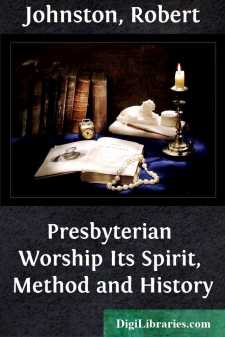Categories
- Antiques & Collectibles 13
- Architecture 36
- Art 48
- Bibles 22
- Biography & Autobiography 813
- Body, Mind & Spirit 141
- Business & Economics 28
- Children's Books 12
- Children's Fiction 9
- Computers 4
- Cooking 94
- Crafts & Hobbies 4
- Drama 346
- Education 46
- Family & Relationships 57
- Fiction 11826
- Games 19
- Gardening 17
- Health & Fitness 34
- History 1377
- House & Home 1
- Humor 147
- Juvenile Fiction 1873
- Juvenile Nonfiction 202
- Language Arts & Disciplines 88
- Law 16
- Literary Collections 686
- Literary Criticism 179
- Mathematics 13
- Medical 41
- Music 40
- Nature 179
- Non-Classifiable 1768
- Performing Arts 7
- Periodicals 1453
- Philosophy 64
- Photography 2
- Poetry 896
- Political Science 203
- Psychology 42
- Reference 154
- Religion 513
- Science 126
- Self-Help 83
- Social Science 81
- Sports & Recreation 34
- Study Aids 3
- Technology & Engineering 59
- Transportation 23
- Travel 463
- True Crime 29
Presbyterian Worship Its Spirit, Method and History
by: Robert Johnston
Description:
Excerpt
PREFATORY NOTE.
The purpose in the following pages is a simple one. It is to discover the trend of thought in connection with Public Worship within the Presbyterian Church, particularly in Scotland, during the course of her history since the Reformation. The spirit of the Church in her stirring and formative periods, especially if that spirit is a constant one, is pregnant with instruction. Such a constant spirit is readily discovered by a study of the attitude of the Presbyterian Church towards the subject of Public Worship during the course of her history, and to the writer it seems very evident that that spirit indicates an increasing suspicion of liturgical forms in Worship, and a growing confidence in, and desire for, the liberty of untrammeled approach to God.
Whether this spirit be the best or not, it is not the purpose of these pages to discuss. The great principle of the liberty of the Church in matters of detail, is fully recognized, a principle ever to be sedulously guarded, but an appeal is made to the record of history for its evidence as to the historic attitude of the Presbyterian Church, on a question which to-day is claiming the earnest attention of those who desire for that Church fidelity to her Lord and efficiency in His work.
My indebtedness in the study of this subject to Dr. McCrie's Cunningham Lectures on "Scottish Presbyterian Worship," Brown's "Life of John Knox," Sprott's "Scottish Liturgies" and Baird's "Eutaxia," as well as to various Histories of the Reformation in Scotland, and for American Church History to Moore's and Alexander's valuable digests, I gladly and with gratitude acknowledge. An abundant and increasing literature upon the subject of Public Worship is an encouraging sign of the attention which the Church is giving to a matter so vital to its best life.
R. J.
ST. ANDREW'S MANSE,
LONDON, January, 1901.
"While it is admitted that there is a form of government prescribed or instituted in the New Testament, so far as its general principles or features are concerned, there is a wide discretion allowed us by God in matters of detail, which no man or set of men, which neither civil magistrates nor ecclesiastical rulers can take from us."—HODGE.
Chapter I.
"The Word of God, which is contained in the Scriptures of the Old and New Testaments, is the only rule to direct us how we may glorify and enjoy Him."—WESTMINSTER CATECHISM.
The Church of Christ, as a divine communion, exists in the world for a definite and appointed purpose. This purpose may be declared to be twofold, and may be described by the terms "Witness" and "Worship."
It is the evident design of God that the visible Church should bear witness to His existence and character, to His revelation and providence, and to His grace towards mankind, manifested in His Son, Jesus Christ. To Israel God said, "Ye are my witnesses," and to His disciples forming the nucleus of the New Testament Church, the risen Saviour said, "Ye shall be witnesses unto Me."
Side by side with this evident end of the Church's existence is the other one of Worship....


